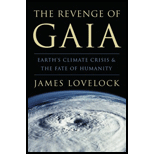 In James Lovelock's 2006 book, The Revenge of Gaia, he argues that the lack of respect humans have had for Gaia, through the damage done to rainforests and the reduction in planetary biodiversity, is testing Gaia's capacity to minimize the effects of the addition of greenhouse gases in the atmosphere. This eliminates the planet's negative feedbacks and increases the likelihood of homeostatic positive feedback potential associated with runaway global warming. Similarly the warming of the oceans is extending the oceanic thermocline layer of tropical oceans into the Arctic and Antarctic waters, preventing the rise of oceanic nutrients into the surface waters and eliminating the algal blooms of phytoplankton on which oceanic foodchains depend. As phytoplankton and forests are the main ways in which Gaia draws down greenhouse gases, particularly carbon dioxide, taking it out of the atmosphere, the elimination of this environmental buffering will see, according to Lovelock, most of the earth becoming uninhabitable for humans and other life-forms by the middle of this century, with a massive extension of tropical deserts.
In James Lovelock's 2006 book, The Revenge of Gaia, he argues that the lack of respect humans have had for Gaia, through the damage done to rainforests and the reduction in planetary biodiversity, is testing Gaia's capacity to minimize the effects of the addition of greenhouse gases in the atmosphere. This eliminates the planet's negative feedbacks and increases the likelihood of homeostatic positive feedback potential associated with runaway global warming. Similarly the warming of the oceans is extending the oceanic thermocline layer of tropical oceans into the Arctic and Antarctic waters, preventing the rise of oceanic nutrients into the surface waters and eliminating the algal blooms of phytoplankton on which oceanic foodchains depend. As phytoplankton and forests are the main ways in which Gaia draws down greenhouse gases, particularly carbon dioxide, taking it out of the atmosphere, the elimination of this environmental buffering will see, according to Lovelock, most of the earth becoming uninhabitable for humans and other life-forms by the middle of this century, with a massive extension of tropical deserts.
Given these conditions, Lovelock expects human civilization will be hard pressed to survive. He expects the change to be similar to the Paleocene-Eocene Thermal Maximum when atmospheric concentration of CO2 was 450 ppm. At that point the Arctic Ocean was 23 °C and had crocodiles in it, with the rest of the world mostly scrub and desert. He says of sustainable development and renewable energy that it came "200 years too late" and that more effort should go into adaptation, including more use of nuclear fission as a viable energy source in the future. He likens the Kyoto Protocol to the Munich conferences that failed to prevent World War II, including the likelihood that the disaster will cause people to come together in common cause. "We have been through no less than seven of these events as humans...comparable in extent to the change" likely to be wrought by global warming.
He claims that Gaia's self-regulation will likely prevent any extraordinary runaway effects that wipe out life itself, but that humans will survive and be "culled and, I hope, refined."
According to James Lovelock, by 2040, the world population of more than six billion will have been culled by floods, drought and famine. Indeed "the people of Southern Europe, as well as South-East Asia, will be fighting their way into countries such as Canada, Australia and Britain".
"By 2040, parts of the Sahara desert will have moved into middle Europe. We are talking about Paris - as far north as Berlin. In Britain we will escape because of our oceanic position."
"If you take the Intergovernmental Panel on Climate Change predictions, then by 2040 every summer in Europe will be as hot as it was in 2003 - between 110F and 120F. It is not the death of people that is the main problem, it is the fact that the plants can't grow — there will be almost no food grown in Europe."
"We are about to take an evolutionary step and my hope is that the species will emerge stronger. It would be hubris to think humans as they now are God's chosen race."
Lovelock believes it is too late to repair the damage...
Revenge of Gaia : Earth's Climate Crisis and the Fate of Humanity » Textbooks.com By James Lovelock - Perseus Distribution (00) - Paperback - ISBN 10 0465041698 - ISBN 13 9780465041695By James Lovelock - Perseus Distribution (00) - Paperback - ISBN 10 0465041698 - ISBN 13 9780465041695
